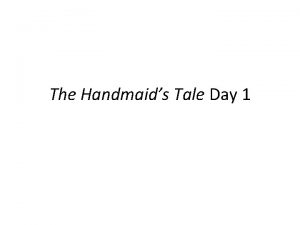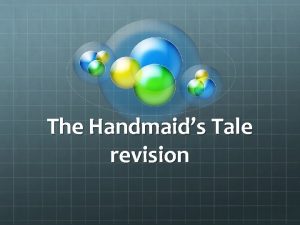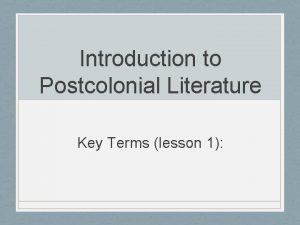The Handmaids Tale 2 Margaret Atwood Neocolonialism Postcolonial













- Slides: 13

The Handmaid’s Tale (2) Margaret Atwood

• Neocolonialism • Postcolonial ecocriticism

• ‘It seems odd that women once spent such time and energy reading about such things, thinking about them, worrying about them, writing about them. They are so obviously recreational. ’ Chpt 16, p 105.

• ‘We expected her to be dragged in at any minute, as she had been before. We count not imagine what they might do to her this time. It would be very bad, whatever it was. But nothing happened. Moria didn’t reappear. She hasn’t yet. Chpt 22, p 143

• ‘This is a reconstruction. All of it is a reconstruction. It’s a reconstruction now, in my head, as I lie flat on my single bed rehearsing what I should or shouldn’t have said, what I should or shouldn’t have done, how I should have played it. If I ever get out of here – ’ Chpt 23, p 144.

• But if you happen to be a man, sometime in the future, and you’ve made it this far, please remember: you will never be subjected to the temptation of feeling you must forgive, a man, as a woman. It’s difficult to resist, believe me, but remember that forgiveness too is a power. To beg for it is a power, and to withhold or bestow it is a power, perhaps the greatest. ’ Chpt 23, p 144.

• ‘So when I left the room, it still wasn’t clear to me what he wanted, or why, or whether I could fulfil any of it for him. If there’s to be a bargain, the terms of exchange must be set forth. This was something he certainly had not done. I thought he might be toying, some catand-a-mouse routine, but now I think that his motives and desires weren’t obvious even to him. They had not yet reached the level of words. ’ Chpt 25, p 163.

• The Commander: ‘Now, tell me. You’re an intelligent person, I like to hear what you think. What did we overlook? • Love, I said. ’ Chpt 34, p 231.

• Salvaging, Chapter 34: • ‘Don’t be stupid. He wasn’t a rapist at all, he was a political. He was one of ours. I knocked him out. Put him out of his misery. Don’t you know what they’re doing to him? ’ • • Offred: ‘One of ours, I think. A Guardian. It seems impossible. ’ Chpt 34, p 292.

• Atwood in interview 1986: ‘The question is, How do we know “reality”? How do you encounter the piece of granite? How do you know it directly? Is there such a thing as knowing it directly without language? Small babies know the world without language’ [(Geoff Hancock, ‘Tightrope-walking Over Niagara Falls’, pp. 190 -220 (p. 209)].

• Language – imported over the old, the agency once had is removed. • Post-Gilead, post-colonial, we find we have been listening to speakers at a symposium – an uncomfortably familiar academic setting. Offred has become a ‘specimen’ and the symposium is on the problems of ‘authentication’ of her tale. • The anthology department is for the study of ‘Caucasian’ people.

• ‘As all historians know, the past is a great darkness, and filled with echoes. Voices may reach us from it; but what they say to us is imbued with the obscurity of the matrix out of which them come; and, try as we may, we cannot always decipher them precisely in the clear light of our own day. ’ Historical Notes, final paragraph.

• • Love After Love By Derek Walcott • The time will come when, with elation, you will greet yourself arriving at your own door, in your own mirror and each will smile at the other's welcome, and say, sit here. Eat. You will love again the stranger who was your self. Give wine. Give bread. Give back your heart to itself, to the stranger who has loved you all your life, whom you ignored for another, who knows you by heart. Take down the love letters from the bookshelf, the photographs, the desperate notes, peel your own image from the mirror. Sit. Feast on your life.
 Context the handmaids tale
Context the handmaids tale Thesis statement handmaid's tale
Thesis statement handmaid's tale The handmaid's tale quote analysis
The handmaid's tale quote analysis Brandt line definition ap human geography
Brandt line definition ap human geography Postcolonial literature
Postcolonial literature The circle game margaret atwood analysis
The circle game margaret atwood analysis The moment margaret atwood analysis
The moment margaret atwood analysis Habitation by margaret atwood analysis
Habitation by margaret atwood analysis The city planners margaret atwood
The city planners margaret atwood Rape fantasies by margaret atwood
Rape fantasies by margaret atwood Stereotypical siren
Stereotypical siren Characteristics of folk literature
Characteristics of folk literature Postcolonial criticism slideshare
Postcolonial criticism slideshare Post colonial key terms
Post colonial key terms

























